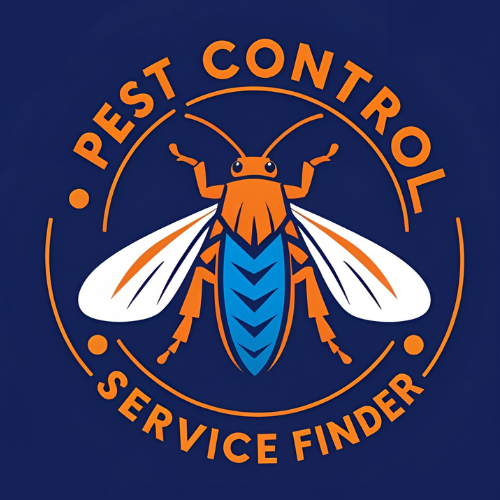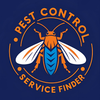Emergency Pest Control 24 7 Your Guide to Fast Relief
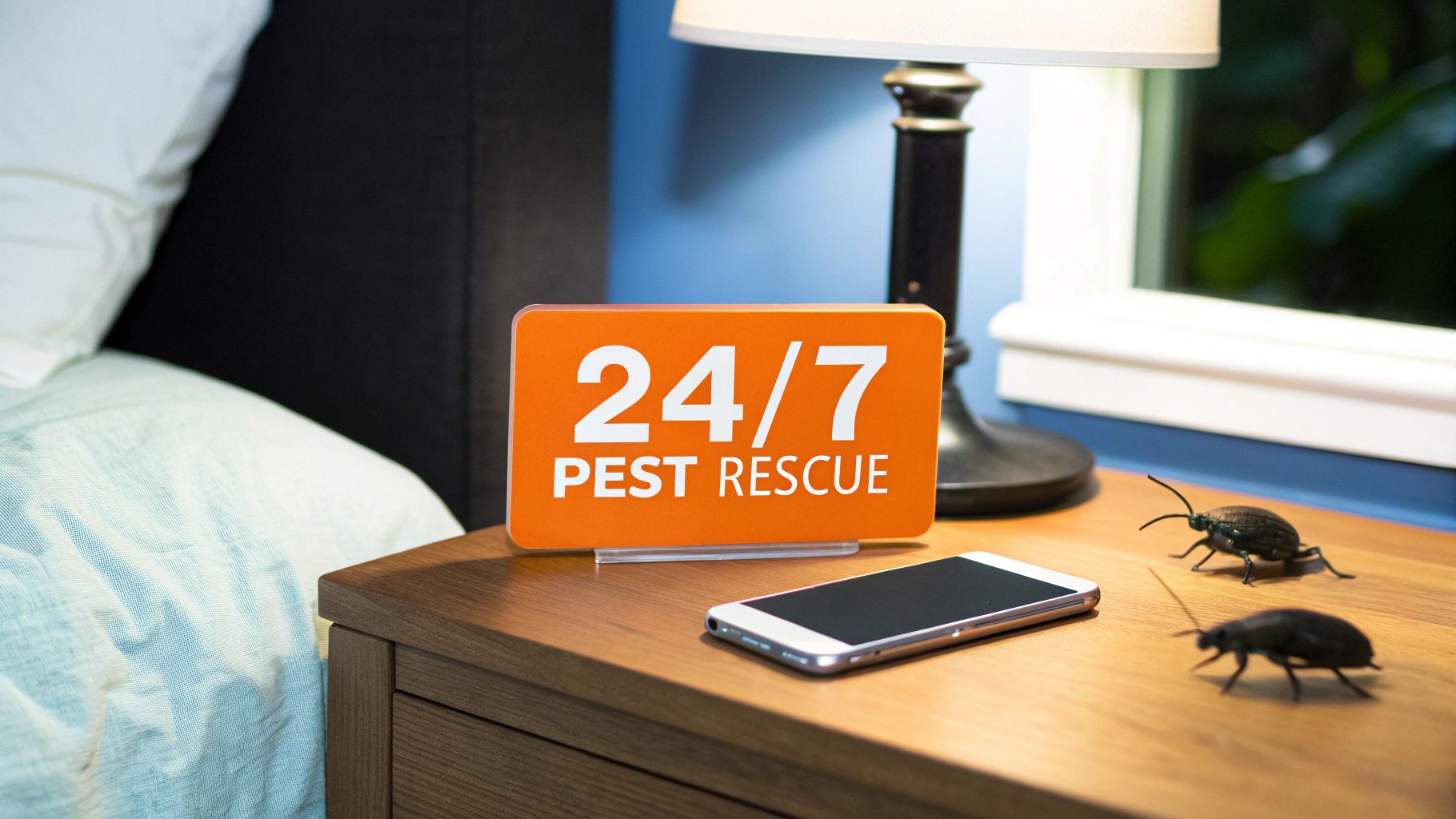
Pest control is not about bugs. It is about your safety. It is about peace of mind. A pest problem is a real emergency. It steals your comfort. It makes your home feel unsafe. You need help. You need it right now. The best first step is to call an expert at +1 855 224 3071.
What a Pest Emergency Really Means
A true pest emergency isn’t about the pest itself—it’s about the sudden loss of control and the wave of panic that hits you. It’s the sound of scratching in your walls at 2 AM. It's stumbling upon a hidden cockroach nest during a routine clean.
The real problem isn’t just the uninvited guest; it’s the unsettling feeling that your home is no longer your own.
This sense of violation demands a fast, decisive response. Your job isn’t to become a DIY exterminator overnight. It's to safely contain the situation, protect your family, and get a professional heading your way immediately. Trying to solve it yourself often just makes things worse. The quickest way to restore peace of mind is to call a dedicated hotline like +1 855 224 3071 that connects you with vetted, local pros ready to roll.
Your First Moves Matter
When a pest crisis hits, what you do in those first few minutes can make a huge difference. Overreacting and spraying mystery chemicals is dangerous. But doing nothing lets the infestation grow. The key is to take calm, smart steps to secure the area until help arrives.
This simple flowchart shows the best way to react: move from that initial shock to containment, then immediately call for help.
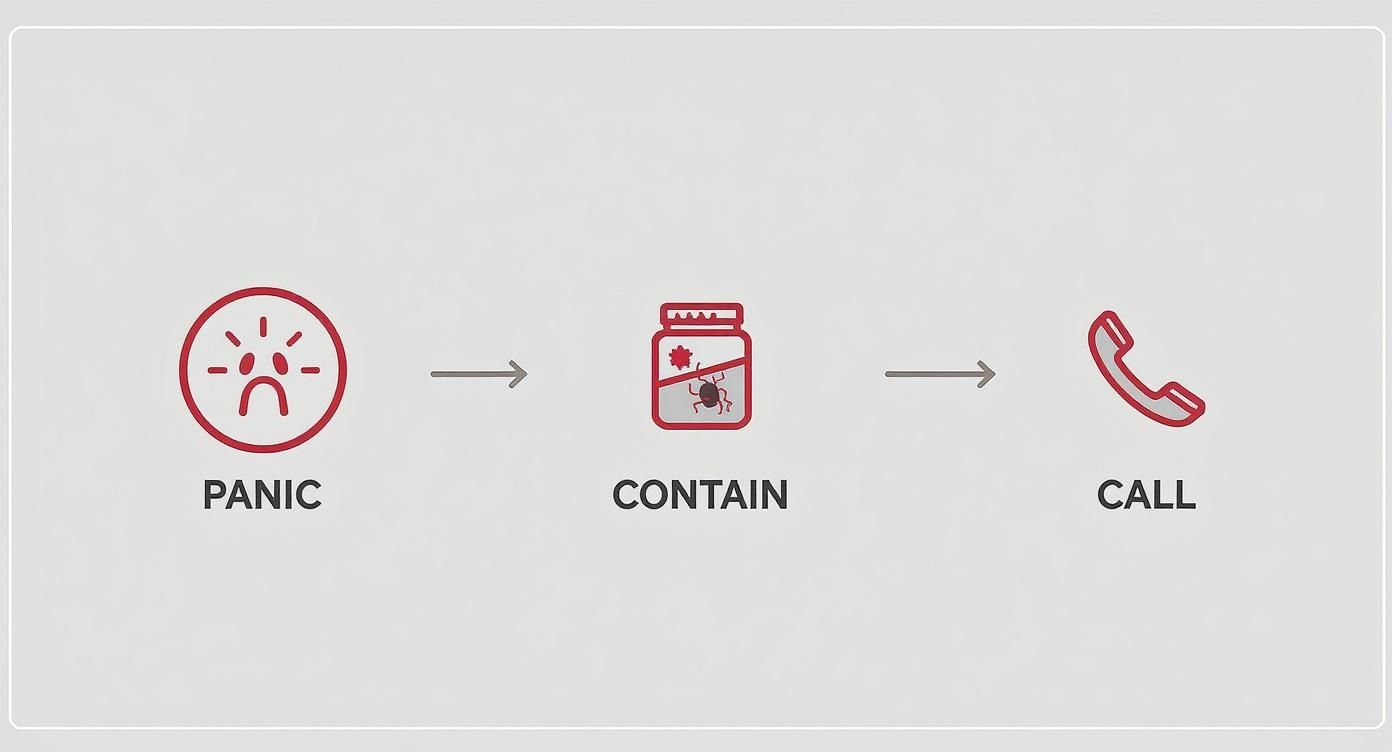
As you can see, the most effective path is a straight line from identifying the problem to calling in a professional. No detours.
To help you through those first crucial moments, here’s a quick-reference guide for some of the most common home invaders. These simple dos and don'ts will help keep you safe while you wait for a 24/7 emergency pest control expert.
Immediate Do's and Don'ts for Pest Emergencies
Remember, the goal right now is containment, not elimination—leave the heavy lifting to the pros.
| Pest Type | What to Do Immediately | What to Avoid |
|---|---|---|
| Rodents | Isolate the room by closing doors and blocking gaps under them. Remove any accessible food sources. | Do not try to corner the animal. Avoid using sticky traps, which can be inhumane and messy. |
| Cockroaches | Use a vacuum to remove visible roaches and their eggs. Seal any open food containers tightly. | Do not use over-the-counter foggers or bombs, as they often push pests deeper into walls. |
| Bed Bugs | Isolate the infested furniture. Avoid moving items from the room to prevent spreading them. | Do not throw out your mattress or furniture. Professionals can often treat and save them. |
| Wasps/Bees | If the nest is outside, close all nearby windows and doors. Keep children and pets far away. | Do not attempt to knock down the nest or spray it with a hose. This will provoke an attack. |
Following this advice ensures you don't accidentally make the situation worse. Once you've taken these initial steps, your next and only move should be getting a professional on the line. For immediate assistance finding a qualified technician in your area, you can always call +1 855 224 3071.
Know Your Enemy: Identify the Pest and Size Up the Threat
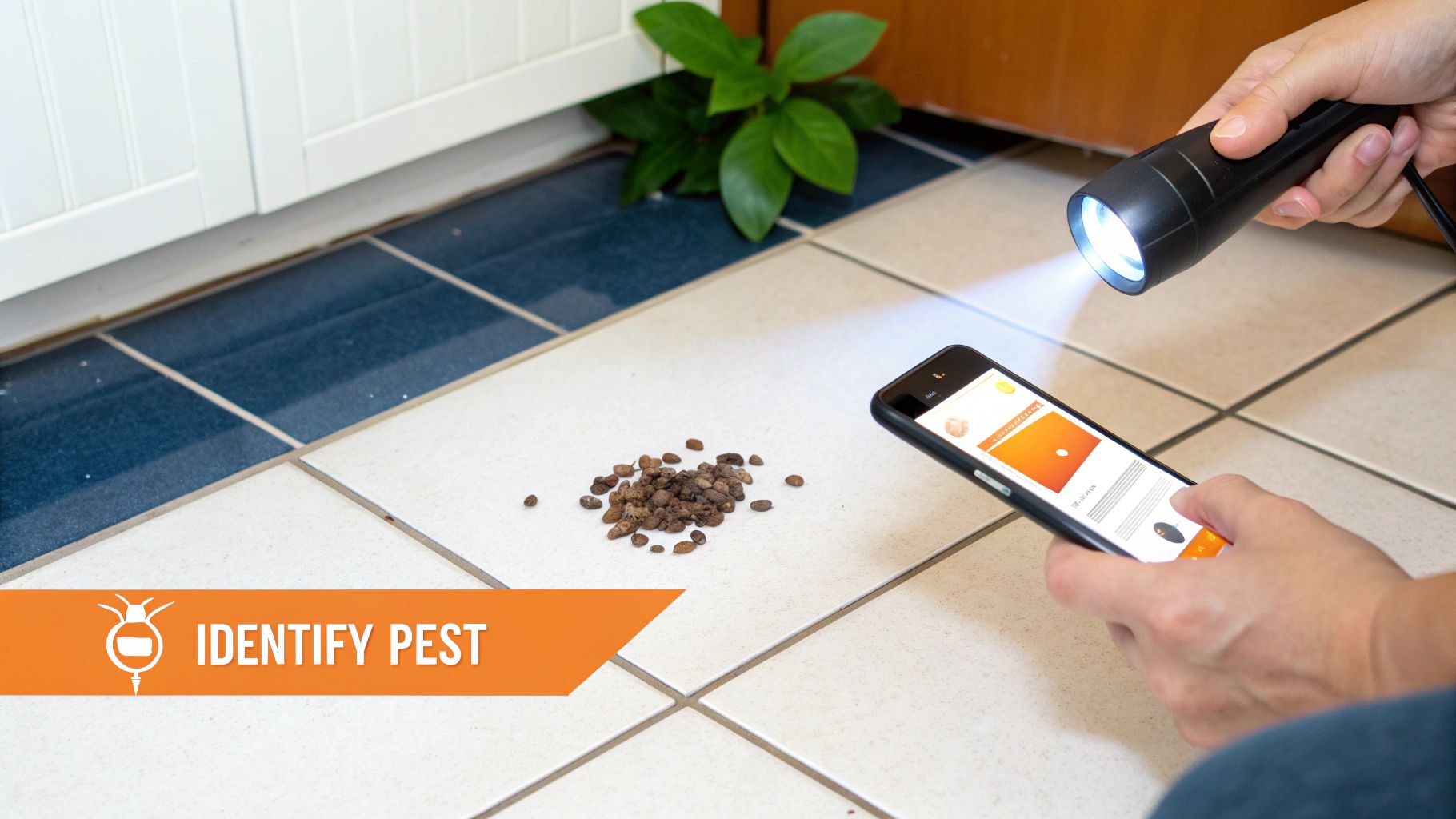
You might be tempted to grab the first can of bug spray you see, but that's a classic—and often costly—mistake. A generic spray doesn't know the difference between a cockroach scurrying under your sink and a termite colony silently chewing through your home's foundation. Each pest is a different battle requiring a specific weapon.
Using the wrong approach can backfire spectacularly. You might scatter the pests deeper into your walls or just make them sick, not dead. That’s why figuring out exactly what you're dealing with is the critical first step. It dictates the entire game plan and ensures the emergency pest control 24 7 service you call shows up with the right tools for the job.
Reading the Signs Rodents Leave Behind
Finding droppings is the obvious red flag, but the real danger is often hidden from view. Rodents are notorious for chewing through electrical wires, creating a massive fire hazard inside your walls. They also contaminate every surface they touch, spreading diseases like salmonella.
- Droppings: Small, pointed droppings usually mean mice. Larger, blunt-ended ones point to rats. Pay attention to where you find them—it reveals their travel routes and potential nesting spots.
- Gnaw Marks: Rodents’ teeth never stop growing, so they have to chew on things constantly. Look for fresh gnaw marks on wood, plastic, and especially electrical wiring.
- Nests: Finding a hidden pile of shredded paper, fabric, or insulation is a dead giveaway. They love dark, quiet corners.
When you can identify these signs, you can give the pros the intel they need. Calling +1 855 224 3071 and saying, "I have what looks like rat droppings and gnaw marks in my attic," is far more effective than just saying "I have a pest." It helps the dispatcher send the right specialist for that exact problem.
The Hidden Dangers of Cockroaches and Termites
Cockroaches and termites pose two very different kinds of emergencies. Roaches are an immediate health risk, while termites launch a slow, silent assault on the structure of your house.
Cockroaches are known to spread nasty bacteria and can trigger severe allergies and asthma attacks, especially in kids. They hide in dark, damp areas like behind the fridge, under the sink, or deep inside kitchen cabinets. If you see one brazenly wandering around during the day, it's a sure sign you have a serious infestation hiding just out of sight.
Termites, on the other hand, are silent destroyers. In the U.S., termites cause over $5 billion in property damage every single year. That staggering number underscores why you can't wait to act. This kind of financial threat, combined with the health risks from other pests, is exactly why demand for around-the-clock emergency pest control is soaring.
Why Bed Bugs Are a Unique Kind of Nightmare
A bed bug problem is a full-blown crisis of its own. While they don't usually spread disease, the psychological toll they take is immense. They rob you of your sleep and peace of mind, causing intense anxiety and paranoia.
The key is to spot them before the infestation gets out of control. We have a complete guide on how to check for bed bugs that walks you through it. You're looking for tiny, rust-colored stains on mattress seams, small black dots (their droppings) on bedding, or the bugs themselves tucked into furniture crevices.
Bed bugs are notoriously difficult to get rid of with DIY methods, so calling a professional is non-negotiable. For a bed bug emergency that simply can't wait, call +1 855 224 3071 right now to get an expert on the line.
How to Find and Vet a 24/7 Exterminator
When you’ve got a pest crisis in the middle of the night, your first instinct is to grab the first number that answers the phone. Don't do it. A panicked decision often leads to unqualified technicians, sky-high bills, and a problem that isn't actually solved.
You absolutely can—and must—vet an emergency pest control 24 7 service, even when you're stressed and the clock is ticking.
The trick is knowing what to look for so you can make a solid choice in minutes, not hours. A company's digital footprint is your fastest clue. It’s important to understand why online reputation is crucial, because reviews and a professional online presence are direct indicators of how they’ll perform in a real emergency.
Your Quick Vetting Checklist
Forget spending an hour doing deep research. When you're in a hurry, you just need to focus on a few deal-breakers to quickly qualify or disqualify a company.
- Licensing and Insurance: This is non-negotiable. A licensed pro is held to safety and effectiveness standards, and their insurance protects you if anything goes wrong on your property. Ask for proof right away.
- Urgent Response Reviews: Don’t just glance at the overall star rating. You need to dig a little deeper. Search for reviews that specifically mention words like "emergency," "after-hours," or "fast response." This tells you if they actually walk the walk when it counts.
- Clear Communication: How did they answer the phone? Did they sound professional and calm, or rushed and annoyed? If they give you vague answers about arrival times or pricing, that’s a huge red flag.
The fastest way to skip the frantic Google searching and vetting process is to use a pre-vetted referral service. A direct line like +1 855 224 3071 connects you straight to a qualified local pro who has already been checked out and is available to help now.
Questions to Ask Before You Commit
Once you get a technician on the line, a few specific questions will tell you everything you need to know about their professionalism and whether they're the right fit for the job. Their answers will give you the confidence to make the final call.
And if you want to explore more options for local experts on your own, our guide on finding pest control services near you has some great additional tips.
Essential Questions for Your Call:
- What is your estimated arrival time? You need a real timeframe, not just "we'll be there soon." A professional service should be able to give you a specific window, usually within 1-3 hours.
- Are your treatments safe for my children and pets? This is often the most important question. Any reputable company will have low-toxicity and eco-friendly options and should be able to explain their safety protocols clearly and confidently.
- Can you explain your process for my specific pest problem? The technician should be able to give you a quick rundown of their plan. You want to hear that they understand your unique situation, not just a generic sales pitch.
- How is your emergency service priced? Be direct. Ask about after-hours fees, surcharges, and what the initial service call actually covers. This is how you avoid nasty surprises on the final bill.
Getting clear, straightforward answers to these questions is the final step in ensuring you’re not just getting fast help, but the right help. If you're struggling to find someone who fits the bill, don't hesitate to call +1 855 224 3071 for immediate assistance.
What to Expect From an Emergency Service Call
You might think an emergency call is total chaos. It’s actually the opposite. A good emergency service is a structured, methodical process designed to get your home back to normal, fast. Knowing what’s about to happen can take a lot of the anxiety out of the situation.
When you call a referral line like +1 855 224 3071, you get connected with a pro who knows this protocol inside and out. It’s not about just spraying chemicals everywhere; it’s a systematic approach to find the problem, treat it, and secure your home against an immediate repeat.
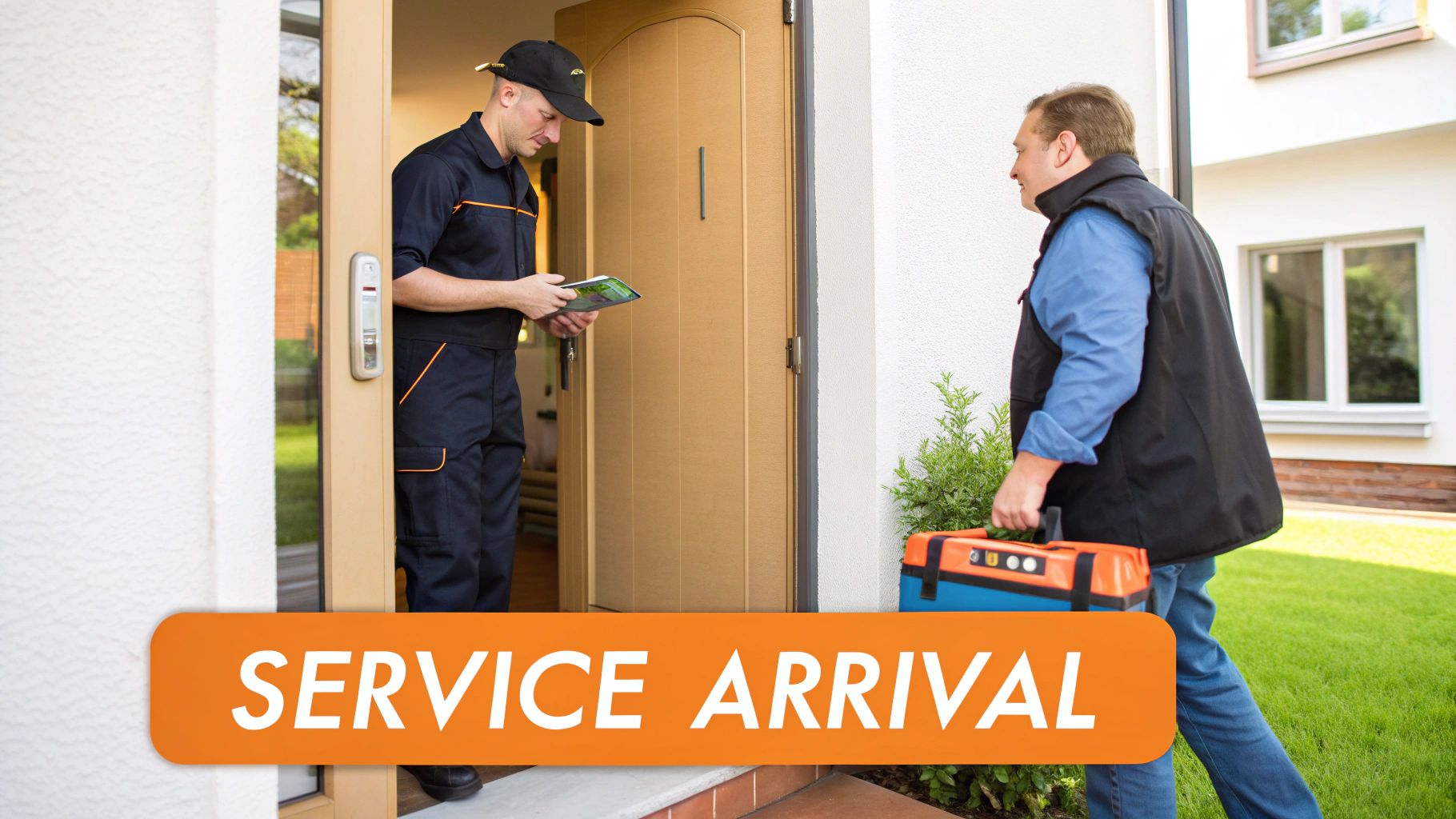
The Initial Inspection and Assessment
The first thing a technician does when they arrive is a thorough inspection. This isn’t just a quick glance around. Think of it as a fact-finding mission to figure out the full scope of your emergency pest control 24 7 situation.
They’re laser-focused on three key things:
- Pest Identification: Confirming exactly what kind of pest you’re up against. You can't treat termites and cockroaches the same way.
- Infestation Severity: Gauging how bad the problem really is. Is it a few ants or a full-blown colony in the walls?
- Entry Point Discovery: Finding out how the pests got inside in the first place. This is absolutely crucial for preventing them from coming right back.
This initial assessment is the most important step. It makes sure the treatment is targeted and effective, not just a band-aid on a bigger problem.
Treatment and Safety Considerations
Once the pro has a handle on the situation, they'll walk you through their recommended treatment plan. This is your chance to ask the single most important question: "Is this safe for my kids and pets?"
Any reputable professional will have child- and pet-safe options ready to go and should be more than happy to explain their safety protocols. They get it—protecting your family is just as important as killing the pests.
They’ll also give you clear instructions on any precautions you need to take, like keeping pets out of a treated room for a few hours. If you ever feel like you're not getting a clear answer, call +1 855 224 3071 to connect with a pro who puts safety first.
An emergency visit is about neutralizing the immediate threat. It's different from a long-term pest management plan. This is all about swift, decisive action to make your home safe again right now.
Post-Treatment and Follow-Up
After the treatment is applied, the job still isn't quite over. The technician should leave you with clear post-treatment instructions. This might include tips on cleaning, when to ventilate the area, or what to look for over the next few days.
You should also get paperwork detailing exactly what they did, what products they used, and any warranty or guarantee they offer. This documentation is your proof of service and your protection if the pests make an unwelcome comeback.
The professional pest control industry, valued at around USD 24.9 billion in 2023, is shifting more and more towards this kind of detailed, data-driven service. You can learn more about the market's growth and trends on fortunebusinessinsights.com.
Breaking Down Emergency Pest Control Costs
You might assume the bill for a late-night call is just some inflated, arbitrary number. The truth is, it's far more structured than that. An emergency pest control 24 7 service isn't just about paying extra for convenience—it's an investment in the immediate safety of your home and your own peace of mind.
Yes, an emergency visit costs more than a standard appointment. But once you understand what goes into that final price, you can see the value and avoid sticker shock. Several key factors determine what you'll pay, and knowing them upfront helps you get a firm, fair quote.
Key Factors Influencing the Final Price
That total cost isn't pulled out of thin air. It’s a combination of specific variables tied directly to your unique situation. Here’s what a pro is thinking about when they build your quote:
- The After-Hours Fee: This is the big one. It’s the premium for getting a licensed technician to your door outside of normal 9-to-5 hours, on a weekend, or during a holiday.
- Type of Pest: The job's complexity can change dramatically depending on the pest. Zapping a single, exposed wasp nest is a world away from tackling a deeply entrenched bed bug or rodent infestation that requires a full-scale treatment plan.
- Size of Your Property: A bigger home or a property with multiple hot spots simply takes more time, more product, and a much more thorough inspection to guarantee the problem is completely solved.
- Treatment Method: The specific solution required makes a huge difference. For instance, a chemical-free heat treatment for bed bugs is far more labor-intensive and expensive than a standard spray application for cockroaches.
Getting a Clear Quote and Avoiding Surprises
To steer clear of hidden fees, always get a detailed quote over the phone before you agree to have someone come out. For a deeper dive into what you can expect to pay, check out our complete guide on the cost of pest control services.
When you call, be ready with as many details as possible. The more info you can provide, the more accurate their estimate will be.
A reputable company will always be transparent about its pricing. Don't be shy—ask them to break down the costs for you. This kind of clarity is the hallmark of a true professional. In fact, this demand for reliable, upfront service is driving major industry growth. The global pest control market is projected to more than double, growing from USD 26 billion to USD 53.1 billion by 2035, largely because homeowners are more focused on health and sanitation than ever. You can discover more insights about these market trends on futuremarketinsights.com.
For a transparent quote from a vetted local expert right now, call +1 855 224 3071.
Your Questions About 24/7 Pest Services Answered
Let's clear something up. A "24/7 service" isn't just about having someone to answer the phone in the middle of the night. It's a promise that a real, qualified technician is on standby, ready to head your way at any hour. This isn't about taking a message for the morning shift; it's about dispatching actual help for your emergency pest control 24 7 crisis.
When you're panicking, you need straight answers, not a sales pitch. We’ve pulled together the most common questions homeowners have so you can make a clear-headed decision, even when things feel chaotic.
How Quickly Will an Emergency Exterminator Arrive?
This is always the first question: "How fast can you get here?" In most true emergencies, you can expect a technician to arrive within a 1 to 3-hour window. That quick turnaround can be a lifesaver when you're facing down an aggressive pest or discovering a massive infestation after dark.
Of course, a few real-world factors can tweak that timeline:
- Your Location: Living way out in a rural area will naturally take longer than being in a dense suburban neighborhood.
- Time of Night: A call placed at 3 AM might have a slightly longer response time than one at 10 PM, simply due to fewer technicians on the road.
- Service Demand: If a big storm just rolled through or there's a local pest outbreak (like a termite swarm), demand can spike, and you might have to wait a bit longer.
Using a dedicated hotline is your fastest path to getting help. When you call +1 855 224 3071, the system instantly locates the nearest vetted professional who's actually available, slashing the time you'd spend searching and the time they'd spend driving.
Are the Treatments Safe for My Kids and Pets?
The thought of someone spraying chemicals inside your home is nerve-wracking, especially with children or pets around. Thankfully, the professional pest control industry has come a long way. You no longer have to pick between a pest-free home and your family's safety.
When the technician shows up, don't be shy. Be direct and ask them these crucial questions before they start:
- "What are my options for eco-friendly or low-toxicity treatments for this specific pest?"
- "What exact safety steps do I need to take after you're done?"
- "Is there a set amount of time we need to keep our kids or pets out of this area?"
A true professional will not only expect these questions but will welcome them. They should be able to walk you through their products and process with confidence, making it clear that your family's well-being is their priority. If they brush you off or can't give you a straight answer, that's a huge red flag.
Does One Emergency Visit Solve the Problem Permanently?
It’s important to have realistic expectations here. The primary goal of an emergency pest control 24 7 visit is to stop the immediate threat and make your home safe right now. Think of it like a medic stopping the bleeding.
The technician’s job is to eliminate the pests you can see, seal up any glaring entry points, and give you back your peace of mind.
For a deeply rooted problem—like termites chewing through your home's foundation or an established rodent family in the attic—one visit is just the critical first step. It's almost never the final one. The emergency tech will almost certainly recommend a follow-up inspection to develop a long-term treatment and prevention plan. This is what ensures the problem doesn't just come roaring back a few weeks later.
When you need fast, reliable, and safe pest removal, you don't have time to vet dozens of companies. Pest Control Service Finder connects you directly with a pre-screened, local expert ready to handle your emergency now.
